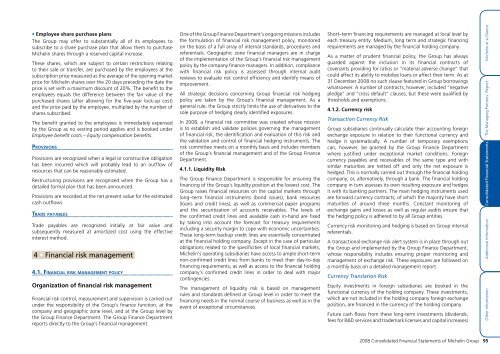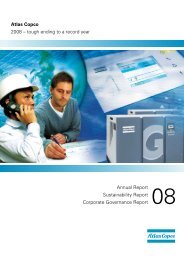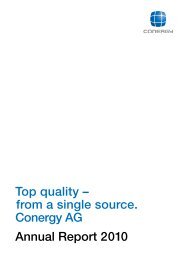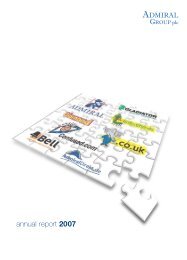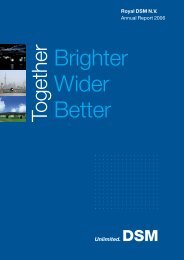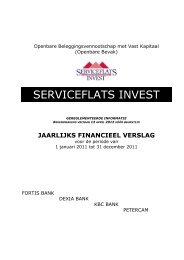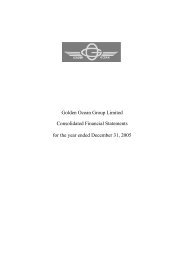MICHELIN - 2008 ANNUAL REPORT
MICHELIN - 2008 ANNUAL REPORT
MICHELIN - 2008 ANNUAL REPORT
Create successful ePaper yourself
Turn your PDF publications into a flip-book with our unique Google optimized e-Paper software.
Employee share purchase plans<br />
The Group may offer to substantially all of its employees to<br />
subscribe to a share purchase plan that allow them to purchase<br />
Michelin shares through a reserved capital increase.<br />
These shares, which are subject to certain restrictions relating<br />
to their sale or transfer, are purchased by the employees at the<br />
subscription price measured as the average of the opening market<br />
price for Michelin shares over the 20 days preceding the date the<br />
price is set with a maximum discount of 20%. The benefit to the<br />
employees equals the difference between the fair value of the<br />
purchased shares (after allowing for the five-year lock-up cost)<br />
and the price paid by the employee, multiplied by the number of<br />
shares subscribed.<br />
The benefit granted to the employees is immediately expensed<br />
by the Group as no vesting period applies and is booked under<br />
Employee benefit costs – Equity compensation benefits.<br />
PROVISIONS<br />
Provisions are recognized when a legal or constructive obligation<br />
has been incurred which will probably lead to an outflow of<br />
resources that can be reasonably estimated.<br />
Restructuring provisions are recognized when the Group has a<br />
detailed formal plan that has been announced.<br />
Provisions are recorded at the net present value for the estimated<br />
cash outflows.<br />
TRADE PAYABLES<br />
Trade payables are recognized initially at fair value and<br />
subsequently measured at amortized cost using the effective<br />
interest method.<br />
4 Financial risk management<br />
4.1. FINANCIAL RISK MANAGEMENT POLICY<br />
Organization of financial risk management<br />
Financial risk control, measurement and supervision is carried out<br />
under the responsibility of the Group’s finance function, at the<br />
company and geographic zone level, and at the Group level by<br />
the Group Finance Department. The Group Finance Department<br />
reports directly to the Group’s financial management.<br />
One of the Group Finance Department’s ongoing missions includes<br />
the formulation of financial risk management policy, monitored<br />
on the basis of a full array of internal standards, procedures and<br />
referentials. Geographic zone financial managers are in charge<br />
of the implementation of the Group’s financial risk management<br />
policy by the company finance managers. In addition, compliance<br />
with financial risk policy is assessed through internal audit<br />
reviews to evaluate risk control efficiency and identify means of<br />
improvement.<br />
All strategic decisions concerning Group financial risk hedging<br />
policy are taken by the Group’s financial management. As a<br />
general rule, the Group strictly limits the use of derivatives to the<br />
sole purpose of hedging clearly identified exposures.<br />
In <strong>2008</strong>, a financial risk committee was created whose mission<br />
is to establish and validate policies governing the management<br />
of financial risk, the identification and evaluation of this risk and<br />
the validation and control of financial hedging instruments. The<br />
risk committee meets on a monthly basis and includes members<br />
of the Group’s financial management and of the Group Finance<br />
Department.<br />
4.1.1. Liquidity Risk<br />
The Group Finance Department is responsible for ensuring the<br />
financing of the Group’s liquidity position at the lowest cost. The<br />
Group raises financial resources on the capital markets through<br />
long–term financial instruments (bond issues), bank resources<br />
(loans and credit lines), as well as commercial paper programs<br />
and the securitization of accounts receivables. The levels of<br />
the confirmed credit lines and available cash in-hand are fixed<br />
by taking into account the forecast for treasury requirements<br />
including a security margin to cope with economic uncertainties.<br />
These long-term backup credit lines are essentially concentrated<br />
at the financial holding company. Except in the case of particular<br />
obligations related to the specificities of local financial markets,<br />
Michelin’s operating subsidiaries have access to ample short-term<br />
non-confirmed credit lines from banks to meet their day-to-day<br />
financing requirements, as well as access to the financial holding<br />
company’s confirmed credit lines in order to deal with major<br />
contingencies.<br />
The management of liquidity risk is based on management<br />
rules and standards defined at Group level in order to meet the<br />
financing needs in the normal course of business as well as in the<br />
event of exceptional circumstances.<br />
Short–term financing requirements are managed at local level by<br />
each treasury entity. Medium, long term and strategic financing<br />
requirements are managed by the financial holding company.<br />
As a matter of prudent financial policy, the Group has always<br />
guarded against the inclusion in its financial contracts of<br />
covenants providing for ratios or “material adverse change” that<br />
could affect its ability to mobilize loans or affect their term. As at<br />
31 December <strong>2008</strong> no such clause featured in Group borrowings<br />
whatsoever. A number of contracts, however, included “negative<br />
pledge” and “cross default” clauses, but these were qualified by<br />
thresholds and exemptions.<br />
4.1.2. Currency risk<br />
Transaction Currency Risk<br />
Group subsidiaries continually calculate their accounting foreign<br />
exchange exposure in relation to their functional currency and<br />
hedge it systematically. A number of temporary exemptions<br />
can, however, be granted by the Group Finance Department<br />
where justified under exceptional market conditions. Foreign<br />
currency payables and receivables of the same type and with<br />
similar maturities are netted off and only the net exposure is<br />
hedged. This is normally carried out through the financial holding<br />
company, or, alternatively, through a bank. The financial holding<br />
company in turn assesses its own resulting exposure and hedges<br />
it with its banking partners. The main hedging instruments used<br />
are forward currency contracts, of which the majority have short<br />
maturities of around three months. Constant monitoring of<br />
exchange gains and losses as well as regular audits ensure that<br />
the hedging policy is adhered to by all Group entities.<br />
Currency risk monitoring and hedging is based on Group internal<br />
referentials.<br />
A transactional exchange risk alert system is in place through out<br />
the Group and implemented by the Group Finance Department,<br />
whose responsibility includes ensuring proper monitoring and<br />
management of exchange risk. These exposures are followed on<br />
a monthly basis on a detailed management report.<br />
Currency Translation Risk<br />
Equity investments in foreign subsidiaries are booked in the<br />
functional currency of the holding company. These investments,<br />
which are not included in the holding company foreign exchange<br />
position, are financed in the currency of the holding company.<br />
Future cash flows from these long-term investments (dividends,<br />
fees for R&D services and trademark licenses and capital increases)<br />
Other Information<br />
Additional Information Consolidated Financial Statements The Managing Partners’ Report Michelin at a Glance<br />
<strong>2008</strong> Consolidated Financial Statements of Michelin Group 95


